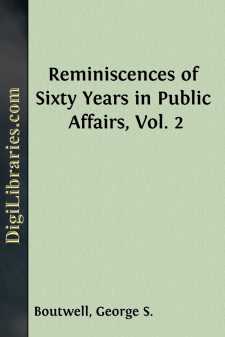Political Science
Political Science Books
Sort by:
MEMOIR OF HIS GRACE THE DUKE OF WELLINGTON. Arthur Wellesley, Duke of Wellington, is the fourth son of Garret,second Earl of Mornington, by Anne, the eldest daughter of Arthur Hill,Viscount Dungannon. He was borne at Dangan Castle, in the county ofMeath, Ireland, on the 1st of May, 1769. As in the case of many of the chief nobility and landholders in Ireland, the ancestors of the Duke were scions of an...
more...
by:
Samuel Adams
TO RICHARD HENRY LEE. [MS., Samuel Adams Papers, Lenox Library.] BOSTON Jany 1 1778 MY DEAR SIR I had the Pleasure of receiving your Letter dated at York the 23d ofNovr last, which mentions your having before written to me by a youngGentn Capt Romane who was to pass through this Place in his Return toFrance. That Letter has not yet come to Hand. I shall regard all yourRecommendations with the utmost...
more...
by:
Thomas Jefferson
LETTER I.—TO RICHARD HENRY LEE, April 22, 1786TO RICHARD HENRY LEE.London, April 22, 1786. Dear Sir, In your letter of October the 29th, you desired me to send you one of the new lamps. I tried at every probable place in Paris, and could not get a tolerable one. I have been glad of it since I came here, as I find them much better made here. I now deliver one, with this letter, into the hands of Mr....
more...
by:
Andrew W. Young
Chapter I. Mankind fitted for Society, and for Civil Government and Laws. §1. Mankind are social beings. They are by nature fitted for society. By this we mean that they are naturally disposed to associate with each other. Indeed, such is their nature, that they could not be happy without such association. Hence we conclude that the Creator has designed men for society. It can not, therefore, be true,...
more...
FOREWORD This is not merely a book about the Russian Jews. It is a marvellous revelation of the Russian soul. It shows not only that the overwhelming majority of the Russian intellectuals, including nearly all of her brilliant literary geniuses, are opposed to the persecution of the Jews or any other race, but that they have a capacity for sympathy and understanding of humanity unequalled in any other...
more...
by:
John Durand
PREFACE By André Chevrillon. "To treat of the Church, the School, and the Family, describe the modern milieu and note the facilities and obstacles which a society like our own encounters in this milieu, such was the program of the last section of the "Origins of Contemporary France." The preceding volume is a continuation of the first part of this program; after the commune and the...
more...
by:
Woodrow Wilson
I There is one great basic fact which underlies all the questions that are discussed on the political platform at the present moment. That singular fact is that nothing is done in this country as it was done twenty years ago. We are in the presence of a new organization of society. Our life has broken away from the past. The life of America is not the life that it was twenty years ago; it is not the...
more...
HUMAN NATURE. Truths of the physical order may possess much external significance, but internal significance they have none. The latter is the privilege of intellectual and moral truths, which are concerned with the objectivation of the will in its highest stages, whereas physical truths are concerned with it in its lowest. For example, if we could establish the truth of what up till now is only a...
more...
My election to Congress in 1862 was contested by Judge Benjamin F. Thomas, who was then a Republican member from the Norfolk district. The re-districting of the State brought Thomas and Train into the same district. I was nominated by the Republican Convention, and Thomas then became the candidate of the "People's Party," and at the election he was supported by the Democrats. His course in...
more...
by:
James Madison
Fellow-Citizens of the Senate and House of Representatives: At the period of our last meeting I had the satisfaction of communicating an adjustment with one of the principal belligerent nations, highly important in itself, and still more so as presaging a more extended accommodation. It is with deep concern I am now to inform you that the favorable prospect has been over-clouded by a refusal of the...
more...











